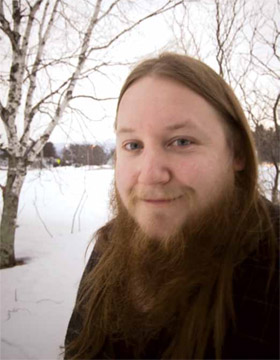Spotlight: Seth Yacovone

Unless you live in Vermont and get to see the soulful, hard-rocking guitar slinger in Burlington, Morrisville or at another of his regular local gigs, it’s been a while since you’ve heard much from Seth Yacovone.
Ten years ago, Yacovone was a staple of the Green Mountain State music scene – home to Phish and many others – and was gaining jam-cred buzz with the Seth Yacovone Band, a gnarly
power trio featuring drummer Steve Hadeka and bassist Tommy Coggio. The group briefly flirted with national attention, but Yacovone decided to shelve his trio in 2004 and ended up withdrawing from full-band touring for years, minus the stray reunion gig or two.
“I didn’t feel like the three of us were progressing musically and I was burned out,” Yacovone recalls in a phone interview from his home. "I’ve played with Tommy since 1996 and Steve
since 1999, and, at that time, we were playing as much as we possibly could. [We had] no management, no road crew, nothing, [and we were] just getting nutty. I didn’t feel like, for the amount of energy we were putting into it, it was the right direction."
In 2008 he released a solo album, Land of Split Decision, recorded with Hadeka and other Vermont mainstays, including keyboardist Ray Paczkowski. It was a double album and what
Yacovone describes as “an allguns- blazing approach.”
“I basically went in thinking: If I never have time again, or a batch of songs I love again, or the ability to record in a nice recording studio, let’s just make this album full-on with horn
arrangements and a lot of the colors you don’t get in a trio," he says. “I went big on that album.”
“Big,” however, didn’t mean much in the way of shows or promotion. Instead, Yacovone spent the better part of the last decade slipping into the role of the much-loved, but regionally-contained performer – the occasional “And Friends” sessions, blues band gigs when the spirit moved him and an association with the 15-year-old New England Grateful Dead tribute project Dead Sessions. He’s also continued a residency at the Burlington club Nectar’s that’s now into its seventh year – just Yacovone, his guitars and a deep, reliable catalog of originals and covers.
“I’ve got my two hours, I’ve got people who know about it. You get to a level of comfort doing that regularly that doesn’t come when you play a place once every few months or once a year,”
he says. “It’s an at-home feeling.” The blowout Dead Sessions gig at New York’s Highline Ballroom on Dec. 30 after a Phish show this past December was, in Yacovone’s estimation, the first time he’d played the Big Apple in six years. But he doesn’t have any regrets about the time spent away.
“I’d started the Seth Yacovone Band when I was 16 and it kept going, which was amazing, but honestly, I’d never known what it was like to not have this organization based on my creative output and the pressure of keeping that afloat,” he says. “I decided to stop. I thought there was more to life than a barroom and a guitar around my neck.”
At the time of this interview, Yacovone is getting ready to reboot the trio concept again, with Hadeka and bassist Alex Budney, known to Burlington-area reggae lovers for anchoring the Pulse Prophets and other groups. The goals are modest – “I’m not taking us to Nebraska to make $80 playing for six people,” he declares – but earnest.
“I want to recommit myself to playing my original rock and roll weirdness, whatever that is,” he enthuses. "It is nice that some people still remember it. But what’s been fun this time around
is that I’m not thinking about the end result. I’m not hung up on where this is going to go and I’m not interested in running a band into the ground."
Vermont remains a beacon, Yacovone says, and it is still one of the country’s most fertile, yet accessible music scenes.
“In the mid-‘90s, there were like 300 good bands and four places to play here, so there was that blow-up,” he says. "You can ski, hunt and play some music up here. It helps that everyone
knows pretty much everyone else."
“I’m a deep Vermonter,” Yacovone adds. “I don’t see myself moving anywhere else.”



















